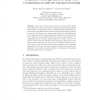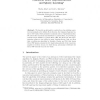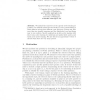100
click to vote
ALT
2009
Springer
15 years 11 months ago
2009
Springer
Abstract. The paper considers the problem of semi-supervised multiview classification, where each view corresponds to a Reproducing Kernel Hilbert Space. An algorithm based on co-...
ALT
2009
Springer
15 years 11 months ago
2009
Springer
Motivated by the principle of agnostic learning, we present an extension of the model introduced by Balcan, Blum, and Gupta [3] on computing low-error clusterings. The extended mod...
ALT
2009
Springer
15 years 11 months ago
2009
Springer
We present a family of adaptive pairwise tournaments that are provably robust against large error fractions when used to determine the largest element in a set. The tournaments use...
ALT
2009
Springer
15 years 11 months ago
2009
Springer
102
click to vote
ALT
2009
Springer
15 years 11 months ago
2009
Springer
Abstract. We present the first (to our knowledge) approximation algorithm for tensor clustering—a powerful generalization to basic 1D clustering. Tensors are increasingly common...
103
click to vote
ALT
2009
Springer
15 years 11 months ago
2009
Springer
Abstract. We consider the framework of stochastic multi-armed bandit problems and study the possibilities and limitations of strategies that explore sequentially the arms. The stra...
ALT
2009
Springer
15 years 11 months ago
2009
Springer
Abstract. We describe an alternative construction of an existing canonical representation for definite Horn theories, the Guigues-Duquenne basis (or GD basis), which minimizes a n...
118
click to vote
ALT
2009
Springer
15 years 11 months ago
2009
Springer
Abstract. Learning from streams is a process in which a group of learners separately obtain information about the target to be learned, but they can communicate with each other in ...
ALT
2009
Springer
15 years 11 months ago
2009
Springer
We consider the problem of learning a finite automaton M of n states with input alphabet X and output alphabet Y when a teacher has helpfully or randomly labeled the states of M u...
164
click to vote
ALT
2009
Springer
15 years 11 months ago
2009
Springer
Abstract. We analyze the expected cost of a greedy active learning algorithm. Our analysis extends previous work to a more general setting in which different queries have differe...



